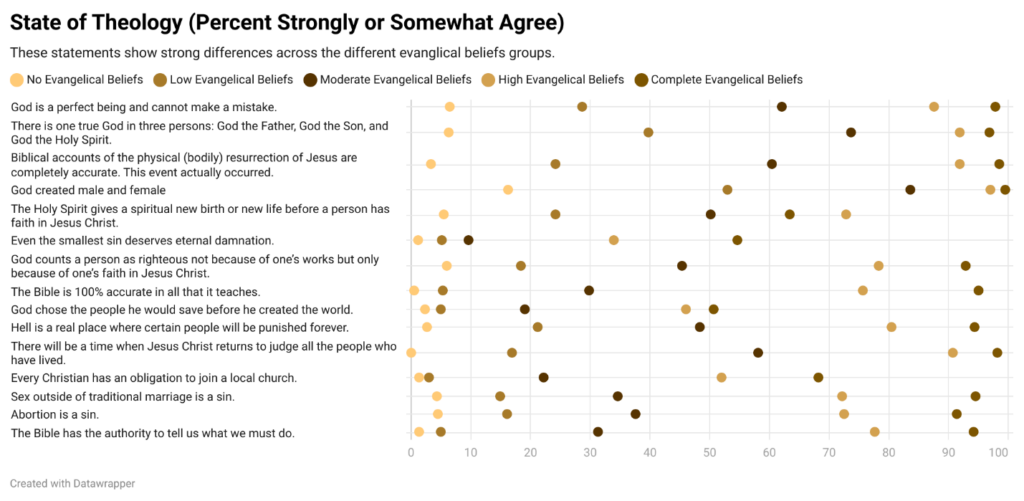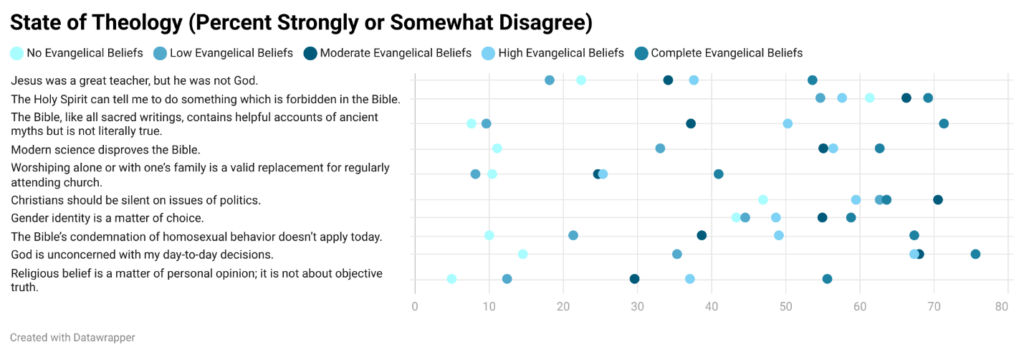
Research gives insight into where Americans find agreement across theological beliefs and where conflicts may emerge.
By Daniel Price
As pastors think about communicating theological concepts and principles, they may find surprising common ground with those outside the church on some issues but also troubling disagreements within their own pews.
The 2022 biennial State of Theology conducted by Lifeway Research for Ligonier Ministries shows there are areas where even those with evangelical beliefs struggle with various truths of Christian theology. Based on their responses to the four statements which define evangelical beliefs, Americans can be divided into five categories: those with no evangelical beliefs (16%), low evangelical beliefs (10%), moderate evangelical beliefs (21%), high evangelical beliefs (33%), and complete evangelical beliefs (21%). Those with complete evangelical beliefs strongly agree with all four of the following statements:
- The Bible is the highest authority for what I believe.
- It is very important for me personally to encourage non-Christians to trust Jesus Christ as their Savior.
- Jesus Christ’s death on the cross is the only sacrifice that could remove the penalty of my sin.
- Only those who trust in Jesus Christ alone as their Savior receive God’s free gift of eternal salvation.
Using these categories along with statistical analysis of the 31 statements in the State of Theology survey, a pattern appears showing where Americans have commonalities or differences across Christian theological beliefs.
Americans can be divided into five categories: those with no evangelical beliefs (16%), low evangelical beliefs (10%), moderate evangelical beliefs (21%), high evangelical beliefs (33%), and complete evangelical beliefs (21%). Click To TweetThe State of Theology questions can be divided into three distinct factors. Looking at the responses to the questions within each factor across the five levels of evangelical beliefs provides insight into where Americans find agreement across theological beliefs and where conflicts may emerge.
Telling truth

Fifteen questions in the State of Theology survey specifically evaluate people’s beliefs about the truthfulness of theological statements. The percentage of people agreeing with the statement generally increases with evangelical beliefs.
Many of these questions describe attributes of God and His position on sin. People with varying degrees of evangelical beliefs are likely to find common ground on these questions. On the other hand, people who already reject many of the biblical principles communicated by Christians disagree with these statements.
Among Americans with complete evangelical beliefs, over 95% agree with six of the statements. And more than 90% agree with five more. Less than 70% agree with the remaining four statements. The statement Americans with complete evangelical beliefs are least likely to agree with is “God chose the people he would save before He created the world” (51%). This statement is understandably difficult to digest and has great potential for misunderstanding and misapplication. This is the one statement where there is no significant difference between those with complete evangelical beliefs and high evangelical beliefs (51% v. 46%).
There is only one statement where those with complete evangelical beliefs are not the most likely to agree. Those with high evangelical beliefs are more likely than those with complete evangelical beliefs to agree “the Holy Spirit gives a spiritual new birth or new life before a person has faith in Jesus Christ” (73% v. 63%). Again, this touches on contested issues within Christianity.
People with no evangelical beliefs are resolute in their positions against all 15 of these statements. There is only one statement more than 7% of Americans without evangelical beliefs agree with; 16% of those without evangelical beliefs agree “God created male and female.” This is an interesting result considering the many current controversies regarding gender in American society.
There are two statements where less than 1% agree: “The Bible is 100% accurate in all that it teaches” and “There will be a time when Jesus Christ returns to judge all the people who have lived.” The latter statement has zero support (0%) from those with no evangelical beliefs. Since this statement has the most potential for personal accountability, it is logical those who fully reject evangelical beliefs also fully reject this statement.
Secular separation

Ten questions in the State of Theology survey evaluate religious distinctives. These ten statements have less separation among those with different levels of evangelical beliefs. The range of percentages is lower for these statements and there are more interactions across levels of evangelical beliefs.
For example, those with complete evangelical beliefs are the most likely to disagree with the statement “God is unconcerned with my day-to-day decisions.” But that is still only around 3 in 4 (76%). They are also the most likely to disagree that “worshiping alone or with one’s family is a valid replacement for regularly attending church.” But with this, it’s slightly higher than 2 in 5 (41%). This shows there is less universal acceptance among people with evangelical beliefs in these statements as compared to the statements in the previous section.
There are statements with unusual interactions among the levels of evangelical beliefs, where it doesn’t follow the trend of increased agreement with increased acceptance of the four evangelical distinctives. Similar percentages of those with no (43%), low (45%), and high (49%) evangelical beliefs disagree with the statement that “gender identity is a matter of choice.” And those with moderate (55%) and complete (59%) evangelical beliefs are only slightly more likely to disagree.
For the statement, “The Holy Spirit can tell me to do something which is forbidden in the Bible,” there are no significant differences across the levels of evangelical beliefs. And there is no direct correlation between the level of disagreement and the level of evangelical beliefs. Those with no (61%), low (55%), moderate (66%), high (58%), and complete (69%) evangelical beliefs disagree with this statement at varying levels. This indicates respondents may hold different interpretations of this statement. Some may disagree because they do not believe the Holy Spirit exists and could tell them anything. Some may disagree because they do not believe the Bible forbids anything. And some may disagree because they accept the authority of the Bible.
Complex confusion

Finally, these six questions consider people’s beliefs about some nuances of who God is and who He says people are. This last factor is where the lines across levels of evangelical beliefs are most blurred. These statements are highly contentious and touch on sensitive subjects. Most of the statements saw similar response levels among those with no or complete evangelical beliefs.
The statement “Jesus is the first and greatest being created by God” flipped the script from other statements. Those with no evangelical beliefs disagree more than any other group (77%). This is the only statement in this section where more than 50% of any group disagreed. Those with no evangelical beliefs may disagree with this statement for multiple reasons, none of which align with the biblical reason for rejecting it. They may disagree with the concept of creation in general. They may find fault with Jesus being called the greatest being. Finally, they may not agree Jesus, if created, was first. Conversely, only 21% of those with complete evangelical beliefs disagreed with this statement.
“Pastors and church leaders should not make assumptions about what shared theological beliefs they have with both those in their community and in their congregation.” — Daniel Price, @LifewayResearch statistician Click To TweetPastors and church leaders should not make assumptions about what shared theological beliefs they have with both those in their community and in their congregation. There may be some areas of unaware agreement with those outside the church and places for renewed focus and correction within the congregation.
For permission to republish this article, contact Marissa Postell Sullivan.
Daniel Price
Daniel is a statistician for Lifeway Research.










